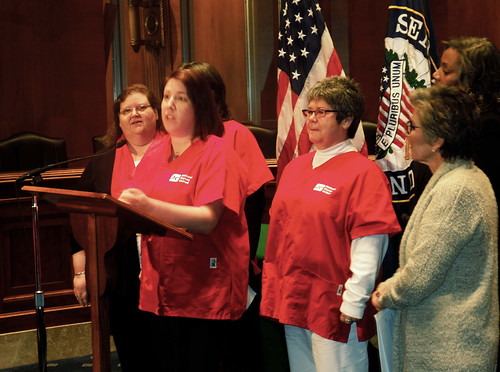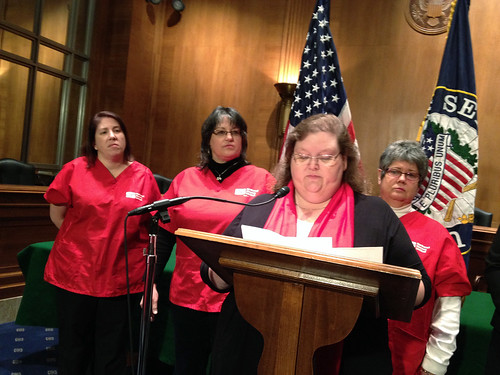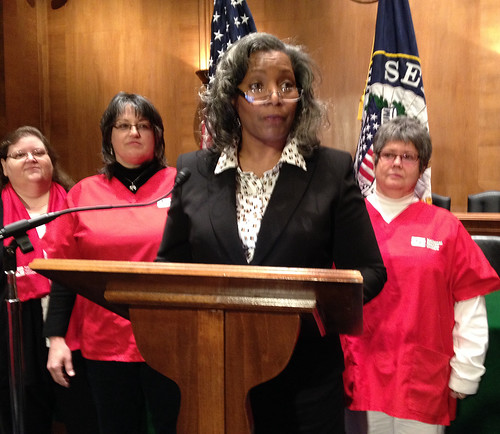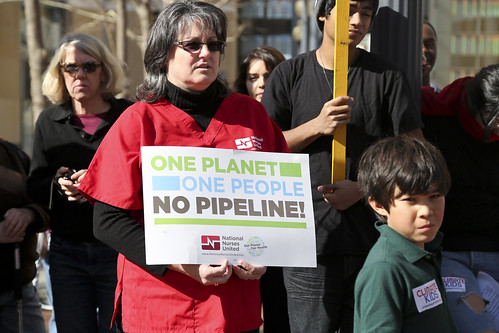Author Archives: Editor
Nurse Practitioners & Meaningful Use Webinar
ANA Blog: RN Retirements
5 Ways Travel Nursing Improves Your Skills

5 Ways Travel Nursing Improves Your Skills: Learn how you can take your professional skills to the top of the mountain!
Travel Nurses are a highly skilled bunch of healthcare professionals. They must hit the ground running at each new facility, so they must be fully clinically and professionally prepared. But, even though you arrive at an assignment with a sharp skill set, travel nursing will even help you hone your skills even more!
Here are 5 ways travel nursing improves your skills:
Proving Adaptability
Travel nursing lets you practice and prove your adaptability. You have to be flexible in terms of patients, colleagues, locations, hospital policies and systems, and more. Adaptability is an asset for any nurse — and traveling is one of the best ways to practice this skill.
Encountering Variety
There are A LOT of x-factors when it comes to hospitals, their purpose, designations, and the area they are in. For example, as you move from one area to another you will likely treat a greater variety of patients. Hospitals can be rural, urban, different sizes, cater to different demographics, teaching hospitals, and even more differences that will translate to a wider variety of experience for you — and your resume!
Meeting the Challenge
Travel Nurses can gain a lot of confidence from facing and meeting the new challenges of traveling. There are a lot of things in life that might seem daunting at first, but once you conquer them you really get in touch with your own strength and that feels amazing. Succeeding in travel nursing will build your confidence which in turn enhances your skills.
Learning New Systems
In your travels it’s likely that you’ll encounter a variety of EMR systems. As you work with each different system you’ll become proficient and this makes you even more marketable and flexible in the future.
Practicing People Skills
While travel nursing you will meet a greater variety of personalities than a perm nurse — including patients, colleagues, and hospital administration. This exposure to a lot of different people and temperaments will leave you with awesome people skills.
Surely there are more than 5 ways travel nursing improves your skills — what are some ways you’ve benefitted from?
Call for Abstracts for 2015 Quality Conference
Cloud storage for the Travel Nurse
How Living in the Cloud Can Save Time and Your Sanity The Following is a Guest Article via: The Nerdy Nurse To some terms like “the cloud” seem like foreign computer jargon used by only the nerdiest of computer geeks. However, the cloud is actually very user-friendly way to store documents online and allows for […]
The post Cloud storage for the Travel Nurse appeared first on The Gypsy Nurse.
Willmar Nurses Go to City Hall
Nurses from Rice Memorial Hospital in Willmar, Minnesota, showed up in full force with their families to report to the City Council the community needs first-rate nurses and first-rate patient care.
Carolyn Jorgenson, RN, MNA Board member told council members who are the trustees for the hospital that the facility’s management team has set a poor tone with nurses. She told a sea of MNA red in the audience that the employer has delivered an underlying message of disrespect for the value of nursing for the community.
Here are excerpts of the comments offered by Jorgenson at last night’s City Council meeting:
“I absolutely LOVE and live nursing. I believe Rice Memorial Hospital has some of the most dedicated, intelligent and professional nurses and staff that I have ever worked with and the patients get the best nursing care around. But I am here tonight because I am concerned things could quickly change.
The nurses of Rice Memorial Hospital are deeply concerned about the tone set by management’s concessionary proposals made in negotiations with those of us represented by the Minnesota Nurses Association.
The underlying message delivered indicates a disrespect for the value nurses provide in delivering quality care to our friends and family. We are dedicated to taking care of all of the Grandmas and Grandpas, Moms and Dads and children who live in our community. My coworkers and I take pride in delivering my neighbor’s babies here and comforting your ailing Aunts and Uncles when they are in need. This community based Hospital allows us to care for not just patients, but our own friends and families.
We also caution that, should those proposals take effect, the consequences to our beloved community could be dire. When seeking concessions of this magnitude, while other facilities continue to increase investments in the wages and benefits of the nurses, Rice Memorial could become a revolving workforce door. This situation only serves to compromise the continuity of care. It will likely prove to be an economic mistake due to higher retention and recruitment fees. Each time a nurse is replaced, the organization pays the equivalent of at least a year’s salary in expenses. That just doesn’t make common sense.
We ask you to invest in the people who care for those who are at their most vulnerable. Keep the highly skilled registered nurses here in their own community; don’t force nurses to leave Rice Memorial because the hospital no longer offers a competitive wage and benefit package.”
North Shore Medical Center Nurses Plan Informational Picket Thursday, March 27 from 2 – 5 p.m.
As Contract Talks Stall Over Partners’ Plan for Unwarranted Floating of Nurses and Demand to Cut Nurses’ Wage Scale
Nurses Outraged by Partners Dem…
Travel Nursing Challenges: “Where do I find that Dr’s Number?”
There are many travel nursing challenges; leaving new friends behind, negotiating contracts, finding housing, etc. One of the most frustrating for me is figuring out which physician I’m supposed to call, who I can’t call, which Dr’s prefer to be text’ed, etc. You would think that a hospital that frequently uses travelers would have some […]
The post Travel Nursing Challenges: “Where do I find that Dr’s Number?” appeared first on The Gypsy Nurse.
Sign The Nurses’ Petition to John Kerry Demanding a Public Health Eval or #NoKXL
Nurses Say “Don’t Pipeline My Patients!”
Registered nurses from coast to coast are stepping up the challenge to the controversial Keystone XL pipeline with a demand that Secretary of State John Kerry provide proof that Keystone will not harm the health and safety of Americans prior to any final decision on the project.
In addition, National Nurses United, the nation’s largest organization of RNs, is circulating an online petition to Kerry that will be presented to the State Department demanding the guarantee, and has released a new short video from nurses titled, “Don’t Pipeline My Patients.”
To add your voice, sign the petition here >>
To add your voice, sign the petition here >>
NNU announced the latest campaign in a press conference on Capitol Hill Thursday hosted by U.S. Senator Barbara Boxer, who chairs the Senate Committee on Environment and Public Works.
NNU called on Kerry and the Obama administration, who are posed to make a final determination on Keystone soon, to immediately commission a comprehensive analysis on the health impact of Keystone and issue a declarative finding that it will not harm human health – or no pipeline. Boxer and Sen. Sheldon Whitehouse recently made a similar call.
NNU Co-President Karen Higgins, third from right, with NNU members at Senate press conference
Noting that the State Department must determine that KXL is in the national interest, Co-President Karen Higgins, RN said “a project that places the health and safety of our patients, our families, and our communities at substantial risk cannot possibly be in our national interest.”
Sen. Boxer with nurses
Boxer opened by observing, “When you ask the American people which professionals do they trust the most, they put nurses at the top of the list.”
She cited the widespread harm now seen at “each step of the toxic tar sands oil process — from the extraction to the transport to the refining to the waste disposal… don’t just take my word, or that of the peer reviewed science on this issue,” Boxer said, “take the word of America’s most trusted professionals — nurses.”
Boxer emphasized the short shrift the public debate on Keystone has paid to the adverse health effects, including just “one tiny little paragraph” in the voluminous Final Environmental Impact Study released by the State Department in January. The health effects, she said later, “have been swept under the rug.”
Higgins agreed with Sen. Boxer that the debate on the health hazards has been “woefully inadequate” and she cited, as the Sierra Club noted it its coverage of the event, the epidemic proportions of asthma in the U.S. as well as increased rates of cancer, leukemia, skin and eye issues, and nervous system damage as a result of tar sands production.
RNs from across the U.S., including those along the path of the proposed pipeline, spoke about the health harm already caused by tar sands.

Kansas RN Kari Columbus
“Being on the path of the pipeline, I am concerned for our health and safety that a rupture could cause. We have seen what can happen with tar sands pollution and we feel like that’s an experience that we don’t need,” said Kansas RN Kari Columbus. “I daily see the effects of pollution on the health of patients that I take care of daily. I myself have asthma; one of my daughters has asthma, and I see many patients that deal with respiratory illnesses that could be made worse by this incoming impending project.”
Brenda Prewitt, a pediatric RN in Houston, a city plagued by among the worst environmental pollution in the U.S., cited a Rice University study that shows that “levels of cancer causing chemicals produced by oil refining are already in some cases 20 times higher in Houston than in other cities, and this is before the pipeline is coming through.”

Houston RN Brenda Prewitt
“Children living within two miles of the Houston ship channel, which is where the pipeline will come in, are 56 percent more likely to get leukemia than those living 10 or more miles away,” Prewitt continued.
“Tar Sands oil is dirtier than refining conventional oil and results in higher emissions of sulfur dioxide and nitrous oxide, which contribute to respiratory diseases like asthma, chronic bronchitis and lung cancer,” said Prewitt. “According to the EPA short term exposure to elevated levels of sulfur dioxide is associated with reduced functioning of lungs, chest tightness, wheezing, shortness of breath, respiratory illness and aggravation of your cardiovascular system which means your heart.”
“Tar Sands is more costly to refine, not only costly by money but in the end will cost us the health of our children, the health of ourselves and in areas near the pipeline it will cause problems with the health of our land,” noted Prewitt.
Chicago RN Rolanda Watson works in a clinic on Chicago’s South Side that was evacuated in December during a toxic dust cloud blowing off a petroleum coke (petcoke) pile of waste leftover after tar sands is refined.
“These plumes of petcoke,” which Watson noted are toxic and laced with metals such as mercury, lead, arsenic and nickel, “are not covered and they are not contained, so you are constantly getting these clouds blowing everywhere, covering houses and picnic areas.”

Chicago RN Rolanda Watson
“Children can’t play outside, they can’t eat their food outside because these particulates are going to be embedded in their food, and when inhaled they are embedded in their lungs. These particulates can aggravate and can cause, asthma, bronchitis, and lung diseases and these diseases will significantly decrease your chance to fight other infections so in the long run what you will see is more hospitalization and health care costs are going to go up.,” Watson said.
Oakland, Ca. RN Katy Roemer noted that tar sands oil is currently being transported into refineries in Richmond, Ca., exposing 25,000 people, mostly low income and people of color, who live within three miles of the refinery to serious health risk.
“In order to transport it, the tar sands oil must be diluted with very toxic chemicals such as benzene, toluene, chromium and lead,” said Roemer. “The tar sands industry won’t reveal the exact chemical mix used, so when it spills, it is very difficult to clean up. These chemicals pose serious risks to human health such as respiratory toxicity, cancer and nervous system damage. In addition, these chemicals are more corrosive than regular crude oil, which makes spills more likely and toxic when they do occur.

Oakland, CA RN Katy Roemer at KXL protest in February
“Currently the people who live near the Richmond refinery suffer from higher rates of asthma, chronic breathing conditions and cancer. Importing and refining the heavier crude oils like the tar sands oil will lead to more particulate and sulfur emissions and other pollutants in the air, further placing these residents at even more risk,” Roemer said.
“We are already seeing the effects of climate change in more extreme weather patterns, drought, severe winter storms, and hurricanes that cause incredible human suffering and death. We can and must do better for the well-being of our planet and the health of all who live here.”
After the press conference, Boxer then spoke about the health hazards and the NNU campaign at the formal Senate Foreign Relations Committee hearing on Keystone. It’s the nurses, she noted, who see those affected by the adverse health effects “coming into emergency rooms. These are the forgotten voices in this debate. I’m just one Senator, just one vote, but now I have 185,000 nurses behind me.”
